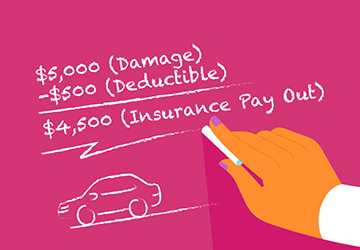Understanding the Role of Deductibles in Auto Insurance Claims
Have you ever been in a fender bender and felt your wallet cringe? You're not alone. Many drivers hit a wall of confusion regarding auto insurance deductibles. It's like a hidden fee that pops up right when you least expect it.
Have you ever been in a fender bender and felt your wallet cringe? You're not alone. Many drivers hit a wall of confusion regarding auto insurance deductibles. It's like a hidden fee that pops up right when you least expect it.
Picture this: You file a claim, thinking you're covered, only to find out you owe a chunk of change before repairs start. Talk about adding insult to injury!

This lack of understanding can leave you scrambling for cash and wondering why you even have insurance in the first place.
But don't worry, we've got your back. This guide will steer you through the twists and turns of auto insurance deductibles. We'll break it into plain English so you'll know exactly what to expect when filing a claim.
Buckle up and keep reading. By the end, you'll be navigating the world of deductibles like a pro, saving yourself headaches and maybe even hard-earned cash.
Why Knowing About Deductibles Matters
Let's face it: nobody likes surprises when it comes to money. That's why getting a grip on deductibles is a game-changer for your wallet and peace of mind.
Think of it as a financial shield. When you know your deductible inside and out, you're armed with the power to pick the right policy. It's like choosing between a comfy sweater and a thin T-shirt – you want the one that fits just right.
Knowing your deductible can also keep you from breaking into a cold sweat when filing a claim. No more shock when you find out how much you owe upfront.
Plus, it's a money-saver in disguise. A higher deductible means lower monthly payments. Or you'll realize a lower deductible fits your budget better.
Either way, understanding deductibles puts you in the driver's seat of your auto insurance. It's all about making choices that work for you, not your insurer.
How Deductibles Work?
Now that we've covered why deductibles matter, let's dive into the details. Don't worry; we won't get too technical. Consider this your roadmap to understanding how deductibles work in fender benders and insurance claims.
What is a Deductible?
A deductible is like the cover charge at a club but for your car insurance. It's the amount you agree to pay before your insurance company takes over the tab. There are different types, mainly collision and comprehensive deductibles.
Here's the lowdown:
● It's a fixed amount you pay out-of-pocket
● You fork over this cash before your insurance kicks in
● The amount can vary depending on your policy
Choosing a Deductible Amount
Picking a deductible is like choosing between a fancy dinner now or saving for a rainy day. Higher deductibles usually mean lower monthly premiums, but you'll pay more if you need to file a claim.
Think about your budget and how much you could comfortably pay if you got into an accident. It's all about finding that spot between affordable monthly payments and not breaking the bank if you need to file a claim.
Deductibles and Claims Process
When disaster strikes, here's how it typically goes down:
● You file a claim with your insurance company
● An adjuster checks out the damage
● You pay your deductible
● Your insurance coverage steps in to cover the rest
It's like a relay race, with you running the first leg before passing the baton to your insurance company.
Examples of Deductible Scenarios
Let's put this into perspective with a couple of real-world scenarios.
Scenario 1: Fender Bender
You back into a pole (hey, it happens to the best of us). The repair costs $1,500, and your collision deductible is $500. You'll pay $500; your insurance covers the remaining $1,000.
Scenario 2: Hail Damage
A freak hailstorm leaves your car looking like a golf ball. Repairs cost $3,000, and your comprehensive deductible is $250. You're on the hook for $250, while your insurance covers $2,750.

Remember, these scenarios can vary based on your specific policy and the type of claim. But they give you a good idea of how deductibles work in practice.
Make Informed Insurance Choices
Now that you're armed with the ins and outs of deductibles, it's time to take action. Dust off that insurance policy and give it a good once-over. Does your deductible still make sense for your current situation?
Remember, the right deductible can be your financial lifesaver when the unexpected happens. It's not just about saving a few bucks on premiums – it's about protecting your wallet when you need it most.
Feel free to shop around or chat with your insurance agent. After all, your peace of mind is worth it. By making wise choices now, you'll be ready to face whatever the road throws.
Frequently Asked Questions
Q. What happens if I can't afford my deductible?
Ans. If you can't pay your deductible, you might have to delay repairs or pay out of pocket. Some repair shops offer payment plans. In a pinch, consider a personal loan or credit card.
Q. Can I change my deductible after purchasing a policy?
Ans. Yes, most insurers allow you to change your deductible mid-policy. But be aware: lowering your deductible usually increases your premium, while raising it typically lowers your premium. Changes often take effect at renewal.
Q. Do I pay a deductible for every claim?
Ans. Generally, yes. However, some insurers waive deductibles in certain situations, like if you're not at fault in an accident. Some policies also offer disappearing deductibles that decrease over time with safe driving.
Q. How do deductibles affect my premium?
Ans. Higher deductibles usually mean lower premiums, and vice versa. It's a trade-off: pay more monthly for a lower out-of-pocket cost when you claim, or save on premiums but risk a bigger hit if you need to file.